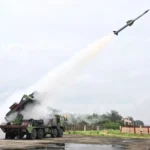“(Washington, D.C. — August 26, 2025) – In a departure from traditional purchasing methods, the Pentagon and the Commerce Department are considering taking equity stakes in major U.S. defense contractors — similar to the recent Intel deal. Commerce Secretary Howard Lutnick described the discussion that developed during a CNBC interview, emphasizing that giants like Lockheed Martin “are “receive 97 percent of their revenue from the government” and effectively operate as government entities. The move reflects a broader push to reshape how the federal government funds national security and what accountability it seeks in return.
Industrial Dynamics Are Changing
The initiative comes amid an administration eager to exert greater influence over industries critical to defense and technology. Government involvement in private industry has typically been limited to emergency bailouts or strategic infusions, such as the recent chipmaker equity transaction under the CHIP Act. Yet today’s defense companies are financially stable, with the government returning capital to shareholders through buybacks rather than seeking government assistance. For the government, equity ownership presents a new mechanism for ensuring long-term alignment between corporate strategy and national security needs, particularly as demand for ammunition and technology innovation increase.
- The United States Military Industrial Complex is a complex network of primary and secondary tier companies. (TLBS)
Short-Term Consequences
If the government takes a stake in contractors like Lockheed Martin or Boeing, it could have several immediate consequences:
- The companies could gain access to federal capital for research and development in areas like missile systems, AI, and hypersonic technology – reducing pressure from private markets – and perhaps stock Reinvest in modernization rather than buybacks.
- Investors are already reacting: Shares of Lockheed and Boeing rose slightly on news of Lutnick’s comments, suggesting cautious optimism that equity stakes could strengthen future contracts or stability.
Such a move could also reshape boardroom dynamics and transparency, as government ownership could invite new oversight or require approvals for strategic decisions.
Long-term consequences
Looking ahead, strategic stakes in defense contractors could reshape multiple dimensions of defense and industry:
- Industrial policy rebalancing: By aligning corporate incentives with national missions, governments can guide infrastructure resilience, innovation platforms, and reinvestment in local supply chains.
- Markets and corporate governance: While equity can boost accountability, critics are less Agility, executive autonomy, and the blurring of lines between private enterprise and public control raise fundamental questions about the role of free markets in defense.
- Setting precedent: This could pave the way for expanding federal ownership into other strategic areas—from rare earth materials to emerging technologies—changing the architecture of private sector investment and competition.
A New Chapter in Defense Industry Relations
For both policymakers and industry leaders, the stakes are high. Will equity partnerships result in continued innovation and alignment with mission requirements, or will they undermine the entrepreneurial agility of private defense companies? Could this signal a shift toward a hybrid public-private defense ecosystem, where the government is not just a customer, but also a co-owner and strategist?
As the Pentagon considers this course, the emergence of a more integrated industrial base – “Connected to both commercial and national security imperatives – could define the next generation of American defense posture.”
You might also like: North Korea Tests New Air-Defense Missiles
FAQs
The Pentagon wants more control and connections with major defense companies like Lockheed Martin and Boeing. By owning shares, the government can guide how these companies’ money is used, ensuring it goes into weapons, AI, and new defense technologies rather than just stock buybacks.
If the government invests directly, companies could get additional funding for research in areas like hypersonic missiles, drones, and artificial intelligence. This could speed up innovation and strengthen the U.S. against rivals like China and Russia.
Investors are watching closely. Defense company shares have already risen following the news. If the Pentagon takes a stake, it could mean stable contracts and more long-term growth, but it could also bring tighter government oversight.
Yes. Experts say the model could extend beyond defense. The government could take stakes in areas like rare earth mining, clean energy, or advanced chipmaking — areas that are critical to national security and supply chain stability.








Leave a Reply